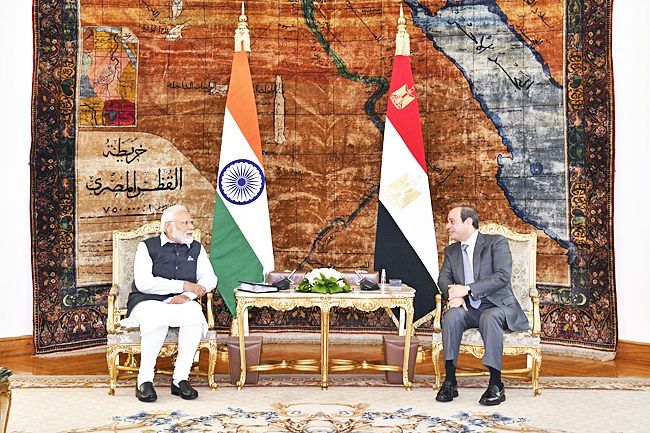CAIRO (AP) – Egyptian President Abdel Fattah el-Sissi yesterday bestowed Indian Prime Minister Narendra Modi with Egypt’s highest honour as the two countries tightened their partnership.
El-Sissi welcomed Modi at the presidential palace in Cairo with the Order of the Nile, the Egyptian presidency said in a statement. The leaders signed a declaration elevating Egyptian-Indo ties to a “strategic partnership”, under which the two nations agreed to intensify their cooperation and hold periodic talks, the statement said.
Egypt and India share deep ties that date back to the 1950s, when the two nations played key roles in founding the Non-Aligned Movement, which had sought an alternative path to siding with either communism or capitalism at the height of the Cold War.
Modi, who arrived in Cairo on Saturday, is the first Indian prime minister to pay a state visit to Egypt in more than two decades. His two-day stop came six months after el-Sissi was in New Delhi as an official guest at India’s Independence Day.
Modi also invited the Egyptian leader to attend the G20 summit, which India will host in September.

Following his talks with el-Sissi, Modi visited a historic mosque, Cairo’s Al-Hakim, which was recently renovated with the help of the India-based Dawoodi Bohra community. He also paid tribute to Indian soldiers who died in World War I and are buried in the Heliopolis War Cemetery in Cairo.
Modi’s trip to Egypt has focused on strengthening bilateral ties between Cairo and New Delhi.
The prime minister said both countries have been moving swiftly to increase bilateral trade to USD12 billion annually within five years – that’s up from USD7.3 billion in 2021 to 2022.
“This is a remarkable year for our shared relations,” Modi told a meeting with Egyptian Prime Minister Moustafa Madbouly on Saturday.
Earlier this year, both countries agreed to boost trade cooperation. India, the world’s most populous country, is one of the top five importers of Egyptian products, including crude oil and liquefied natural gas, salt, cotton, inorganic chemicals, and oilseeds.
Major Indian exports to Egypt include cotton yarn, coffee, herbs, tobacco, lentils, vehicle parts, ships, boats, and electrical machinery.




